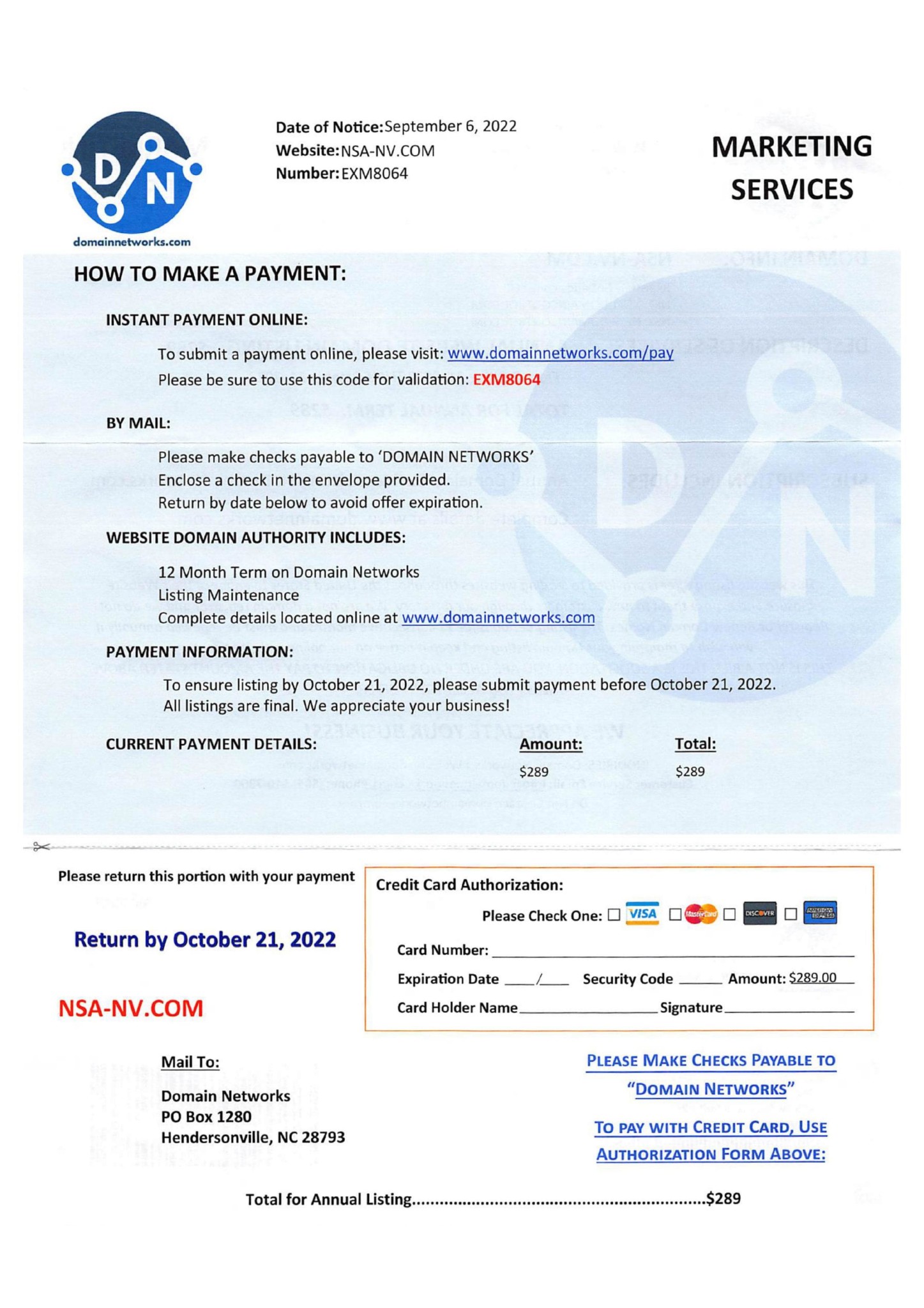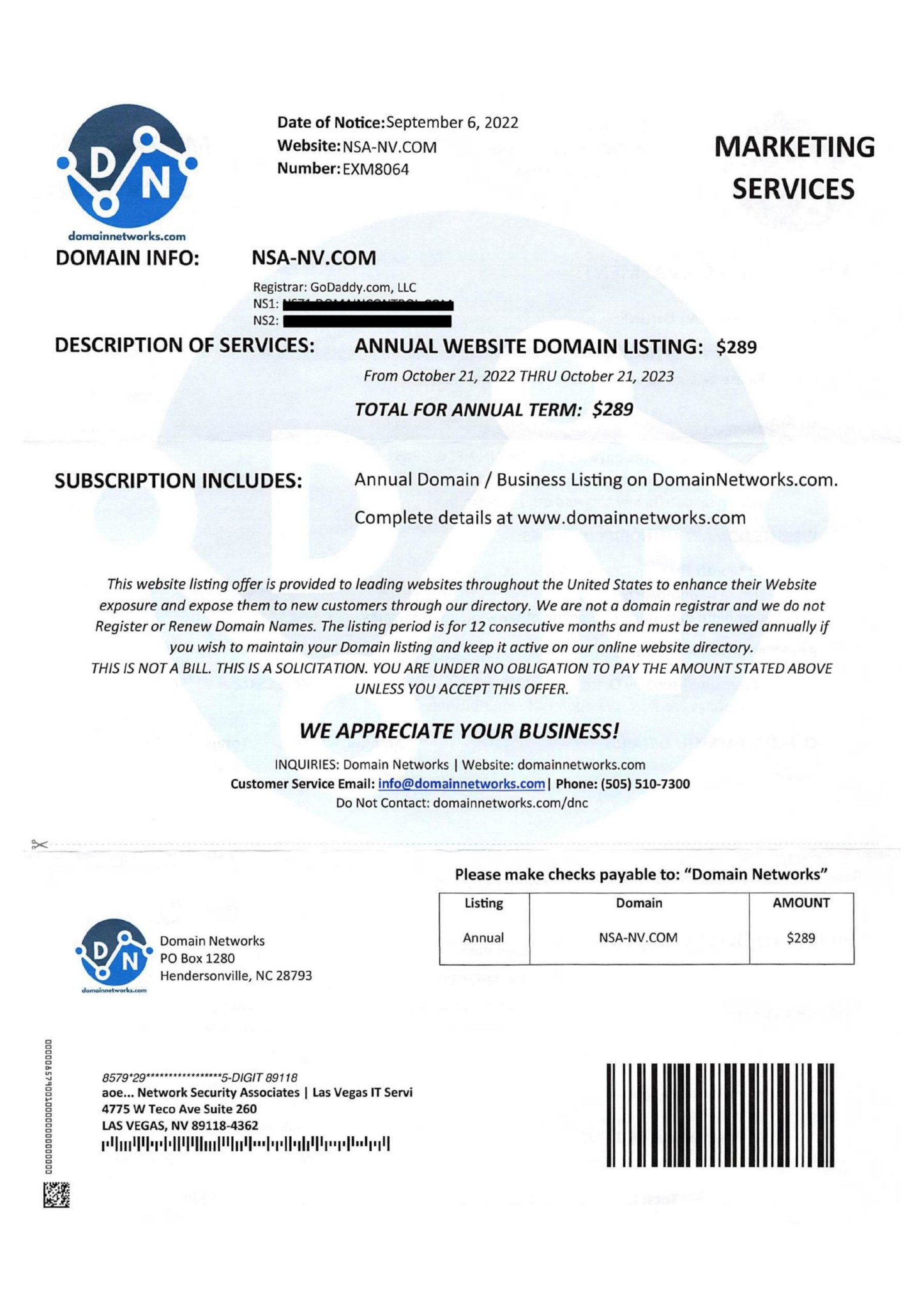A new scam is targeting business owners who own and maintain their company’s website and domain. In what appears to be a legitimate invoice mailed to your business address, a phony directory company called ‘Domain Networks’ requests up to $289 for ‘listing maintenance’. However, the company does not maintain any client domains – they’re simply an online business directory, and an awful one at that. What immediately catches most people eyes is the fact that these bills contain personal information that is accessible through the Internet, but difficult for most to find. This includes your business name and address, domain name, and server names. This predatory company designed these sales pitches to look extremely similar to an invoice that requires payment. They even include a stamped envelope in order to send your payment, in an attempt to further legitimize the scam invoice.
Looks all legit right? Upon further investigation, this is entirely a sham. This predatory piece of mail is designed to look like an invoice to maintain your domain, however, once you read the fine print, you’ll see that the $289 is paid for a listing on the Domain Networks website, where they have a poorly built directory of businesses throughout the US. This directory will do you and your business absolutely no good, as this directory doesn’t even pop up within any relevant Google results. You’re far better off creating a Google My Business, LinkedIn, Yellow Pages, Clutch, or a Yelp page in order to increase your company’s visibility.
You might be thinking, how can scammers get away with this?
In tiny text on the flipside of the invoice charge, Domain Networks confirms: “THIS IS NOT A BILL. THIS IS A SOLICITATION. YOU ARE UNDER NO OBLIGATION TO PAY THE AMOUNT STATED ABOVE UNLESS YOU ACCEPT THIS OFFER.” Although this is stated on the bill, it’s in the middle of a large body of text, and it’s on the flipside of the invoice – so it’s very easy to miss, designed to be buried within the text. This is purely a scam designed to prey upon unsuspecting people, elderly people, or other vulnerable groups. This is why it’s so essential to read the fine print on anything and everything that involves money, before potentially falling into a scam that could cost you and your business hundreds, or even thousands of dollars. Domain Networks only includes these few sentences in the most inconspicuous spot on the letter to make it more difficult for authorities to target them for their criminal activity.
It’s important to know this scam is prevalent – a single Google page of results shows an array of people who’ve received the bill, wondering if it’s legitimate or not. Here at NSA, we are an MSP for several different Las Vegas businesses. Some of our clients even received this bill, and we rushed to let them know that this is an active and prevalent scam targeting business owners. With the amount of personal information featured on these fake invoices, it’s certainly not surprising that some have fell victim to this predatory tactic.
How do I protect my business from Domain Networks and other predatory scams?
When owning and operating a business website, or any other website for that matter, most people usually only have two bills – one is registration for your domain/website name, usually through a website like GoDaddy. The other bills come from your choice of website hosting, which includes companies like Wix, WordPress, and Squarespace. Annually, these combined bills normally don’t add up to more than $100. That number does range for people, but most people are certainly not paying $289 annually, like Domain Networks requests.
If you ever get a weird looking invoice either in the mail or online, always take a moment to research before you get out your wallet. A simple Google search of ‘Domain Networks’ reveals a ton of business owners warning others that this is purely a scam. When searching other companies like GoDaddy, we see they are actually legitimate, with many reviews on an array of websites.
Always be aware of predatory marketing tactics. Usually on fake invoices like these, the company will make sure to print in the fine text that this is purely a sales tactic, in order to bypass authorities. Always make sure to read the text on everything, especially when it involves your business finances.



